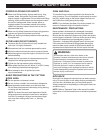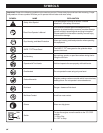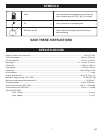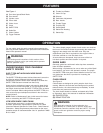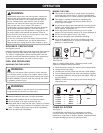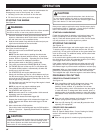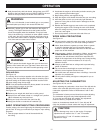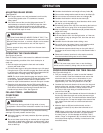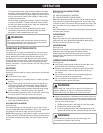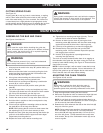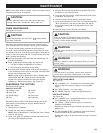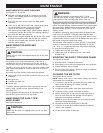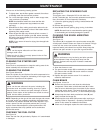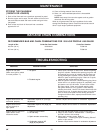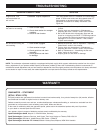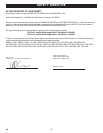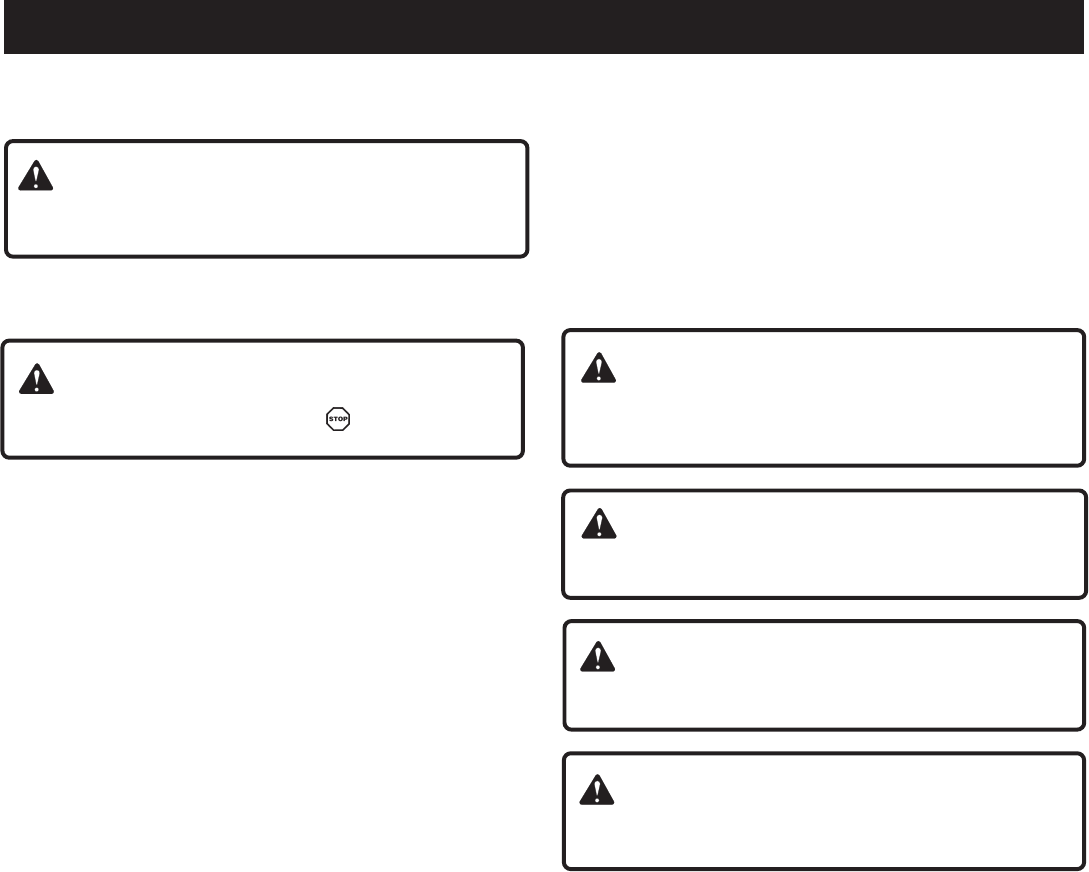
15
UK
CHAIN MAINTENANCE
See Figures 51 and 52.
CAUTION:
Check that the switch is in the STOP “ ” position before
you work on the saw.
Use only a low-kick-back chain on this saw. This fast-cutting
chain provides kick-back reduction when properly maintained.
For smooth and fast cutting, maintain the chain properly.
The chain requires sharpening when the wood chips are small
and powdery, the chain must be forced through the wood during
cutting, or the chain cuts to one side. During maintenance of the
chain, consider the following:
■■
■■
■ Improper filing angle of the side plate can increase the risk
of a severe kick-back.
■ Raker (depth gauge) clearance (A).
See Figure 55.
1. Too low increases the potential for kick-back.
2. Not low enough decreases cutting ability.
■ If the cutter teeth hit hard objects such as nails and stones,
or are abraded by mud or sand on the wood, have the Ryobi
service dealer sharpen the chain.
NOTE: Inspect the drive sprocket for wear or damage when
replacing the chain (B). If signs of wear or damage are
present in the areas indicated, have the drive sprocket
replaced by a Ryobi service dealer.
See Figure 56.
SHARPENING THE CUTTERS
See Figures 53 through 56.
PARTS OF A CUTTER
NOTE: New chain tends to stretch. Check the chain tension
frequently and tension as required.
CAUTION:
A chain tensioned while warm may be too tight upon
cooling. Check the “cold tension” before next use.
(A) Cutting Corner
(B) Side Plate
(C) Depth Gauge
(D)Toe
Be careful to file all cutters to the specified angles and to the
same length, as fast cutting can only be obtained when all
cutters are uniform.
1. Wear gloves for protection.
2. Tension the chain prior to sharpening.
NOTE: Refer to “Maintenance – Adjusting the Chain Tension”
earlier in this manual.
3. Use a 4 mm (5/32 in.) diameter round file and holder. Do all
your filing at the midpoint of the bar.
(E) Gullet
(F) Heel
(G) Rivet hole
(H) Top Plate
4. Keep the file level with the top plate of the tooth. Do not let
the file dip or rock.
See Figure 54.
5. Using light but firm pressure, stroke towards the front corner
of the tooth.
See Figure 55.
6. Lift the file away from the steel on each return stroke.
7. Put a few firm strokes on every tooth. File all left-hand cutters
(A) in one direction. Then move to the other side and file
the right-hand cutters (B) in the opposite direction.
See
Figure 56.
8. Remove filings from the file with a wire brush.
CAUTION:
A dull or improperly sharpened chain can cause
excessive engine speed during cutting which may
result in severe engine damage.
WARNING:
Improper chain sharpening increases the potential
of kick-back.
WARNING:
Failure to replace or repair a damaged chain can cause
serious injury.
WARNING:
The saw chain is very sharp. Always wear protective
gloves when performing maintenance to the chain.
TOP PLATE FILING ANGLE
See Figure 57.
■ (A) - CORRECT 30° – file holders are marked with guide
marks to align file properly to produce correct top plate
angle.
■ (B) - LESS THAN 30° – for cross cutting.
■ (C) - MORE THAN 30° – feathered edge dulls quickly.
SIDE PLATE ANGLE
See Figure 58.
■ (D) - CORRECT 80
o
– Produced automatically if you use the
correct diameter file in the file holder.
■ (E) - HOOK – “Grabs” and dulls quickly, increases the
potential of KICK-BACK.
Results from using a file with a diameter too small or a file
held too low.
■ (F) - BACKWARD SLOPE – Needs too much feed pressure,
causes excessive wear to the bar and chain.
Results from using a file with a diameter too large or file held
too high.
MAINTENANCE



